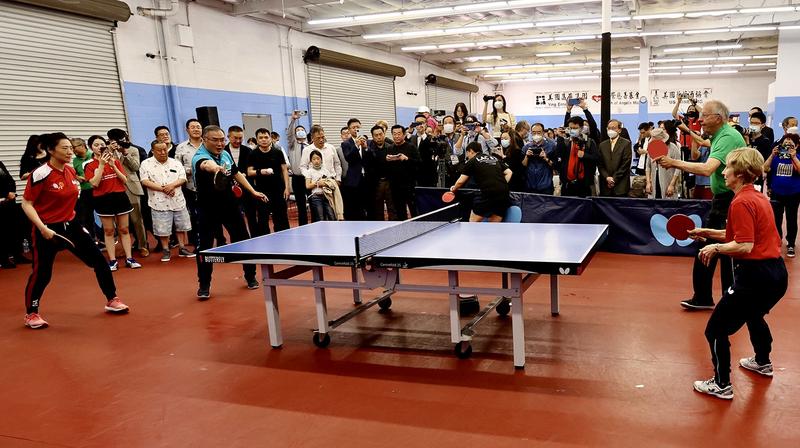 Connie Sweeris and her husband, Dell Sweeris (both at right), who were part of the ice-breaking Ping-Pong Diplomacy in the 1970s as table tennis players, participate in an exhibition match with Virginia Sung, CEO of USA Table Tennis (first from left) and Zhang Ping, Chinese consul general in Los Angeles, on Sunday in Los Angeles. (PHOTO / XINHUA)
Connie Sweeris and her husband, Dell Sweeris (both at right), who were part of the ice-breaking Ping-Pong Diplomacy in the 1970s as table tennis players, participate in an exhibition match with Virginia Sung, CEO of USA Table Tennis (first from left) and Zhang Ping, Chinese consul general in Los Angeles, on Sunday in Los Angeles. (PHOTO / XINHUA)
Connie Sweeris still remembers the anxiety she felt as she entered the Chinese mainland from Hong Kong 51 years ago. Her uneasiness faded soon after she enjoyed a friendly lunch in Guangzhou, Guangdong province, where her team kicked off a weeklong journey across a country they knew little about.
Then 23 years old, Sweeris was part of the United States table tennis delegation that visited China after a chance encounter between US player Glenn Cowan and three-time world champion Zhuang Zedong of China on a bus in Japan in April 1971. Cowan mistakenly boarded the Chinese team bus and shook hands with Zhuang. The interaction caught the attention of Chinese leader Mao Zedong, who invited the US table tennis team to visit China.
Their trip kicked off what became known as Ping-Pong Diplomacy, which laid the foundation for the establishment of diplomatic relations between China and the US.
A year after the US team's trip, the Chinese table tennis team, led by Zhuang, toured the United States, visiting many cities including Los Angeles. The Chinese team also met with then-President Richard Nixon at the White House.
"It was a real thrill for us to be able to cross that bridge and be able to play these friendship matches," Sweeris told China Daily on Sunday after playing a match during an event to mark the 50th anniversary of the Chinese team's visit to the US.
About 200 people, including Chinese Consul General in Los Angeles Zhang Ping, US Congresswoman Judy Chu and officials from the US Olympic Committee and USA Table Tennis participated in the celebration.
The event included friendly matches between teams made up of residents, young local table tennis players, Chinese students and the consulate general staff. The matches were followed by an award ceremony in the evening.
Zhang said friendship between people is the foundation of state-to-state relations, and Ping-Pong Diplomacy is a "wonderful story" in the history of China-US relations.
As the bilateral relationship is at a critical juncture, it's more important than ever "to carry forward the legacy of Ping-Pong Diplomacy", the envoy said.
"Today, the big ball of China-US relations still needs the force of many small balls, like the ping-pong ball, to move it forward," Zhang said. Competition should not dominate the future of the Sino-US relationship, instead friendship should be a "tenacious bond" linking people of the two nations, Zhang said.
Chu said the bilateral relationship is one of the most important in the world, impacting not just economies but also world peace. "And that is why I believe we need to continue to strengthen this relationship moving forward," she said.
Dragomir Cioroslan, director of international strategies and development for the US Olympic and Paralympic Committee, told China Daily that he believes Ping-Pong Diplomacy was the most important diplomatic event of the 20th century and changed the course of history by bringing together two important countries.
With the help of a sport like table tennis, the US and China have shown the world that the spirit of cooperation transcends language and cultural barriers, he said.
"I hope the legacy of the Ping-Pong Diplomacy remains an inspiration for all of us. As we move forward in the future, I like very much the motto of the Beijing 2022 Winter Olympics Games, 'Together for a Shared Future,'" he added.
The slogan of the 1971 exhibition matches was "friendship first, competition second", Sweeris said.
People-to-people exchanges, breaking down barriers and enhancing understanding between people, "that's what diplomacy is all about," she said.
"You don't have to become enemies just because you don't have the same ideologies. And that's what's great about sports," Sweeris said.


